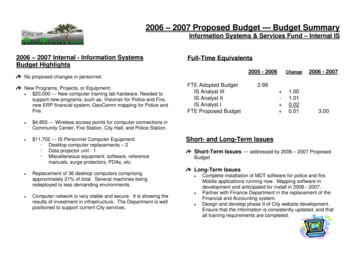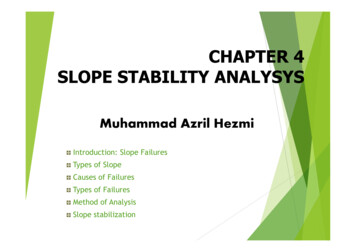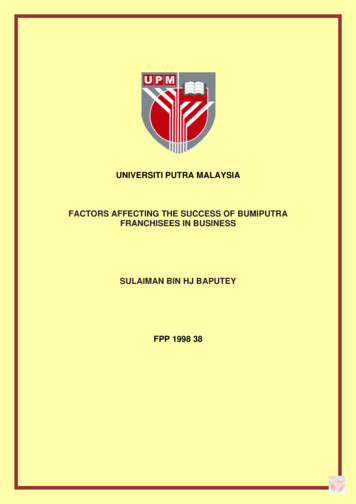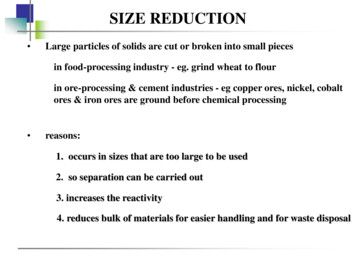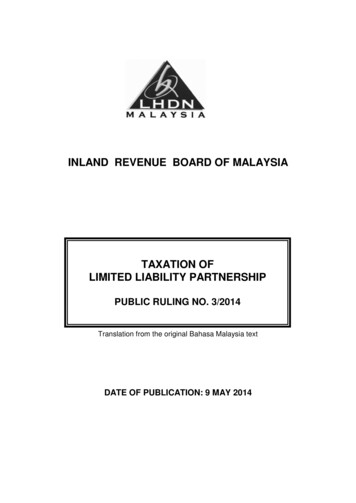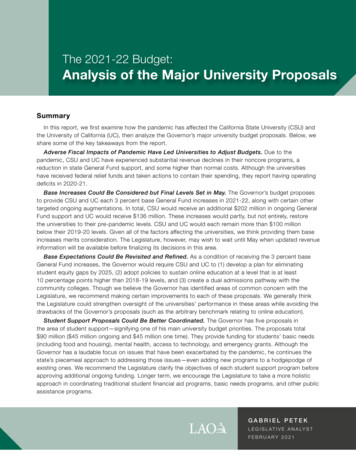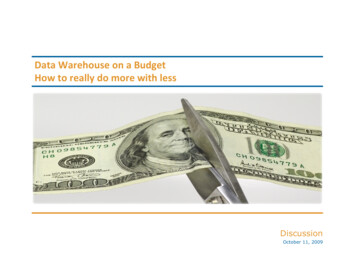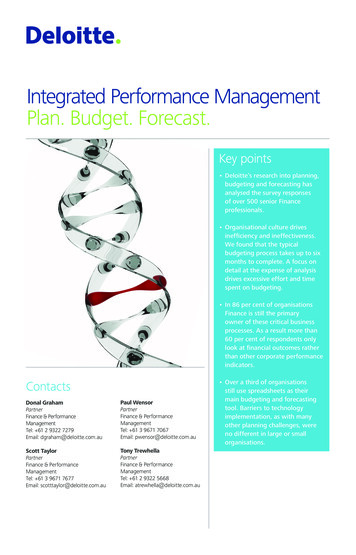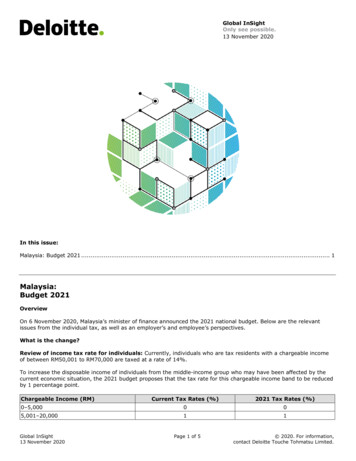
Transcription
Global InSightOnly see possible.13 November 2020In this issue:Malaysia: Budget 2021 . 1Malaysia:Budget 2021OverviewOn 6 November 2020, Malaysia’s minister of finance announced the 2021 national budget. Below are the relevantissues from the individual tax, as well as an employer’s and employee’s perspectives.What is the change?Review of income tax rate for individuals: Currently, individuals who are tax residents with a chargeable incomeof between RM50,001 to RM70,000 are taxed at a rate of 14%.To increase the disposable income of individuals from the middle-income group who may have been affected by thecurrent economic situation, the 2021 budget proposes that the tax rate for this chargeable income band to be reducedby 1 percentage point.Chargeable Income (RM)Current Tax Rates (%)2021 Tax Rates (%)0–5,000005,001–20,00011Global InSight13 November 2020Page 1 of 5 2020. For information,contact Deloitte Touche Tohmatsu Limited.
Chargeable Income (RM)Current Tax Rates (%)2021 Tax Rates –1,000,00026261,000,001–2,000,0002828Exceeding 2,000,0003030Effective date: From year of assessment 2021Increase of tax relief for parents’ medical expenses: The limit of tax relief on expenses for medical treatment,special needs, and parental care will be increased from RM5,000 to RM8,000. This will help reduce the financial burdenof taxpayers in caring for their aged parents.Effective date: From year of assessment 2021Expansion of scope and increase of tax relief for medical expenses for self, spouse, and children: Toalleviate the cost of medical treatment as well as to encourage more Malaysians to be vaccinated, it is proposed thatthe limit and scope for the above relief will be increased as follows.Medical expenses on serious diseases, including fertility treatment, will increase from RM6,000 to RM8,000. Thisincludes: Expenses for a full medical check-up will increase from RM500 to RM1,000; andThe relief will now cover vaccination expenses up to RM1,000 for the taxpayer, spouse, and child. Examples ofapproved vaccines include pneumococcal, influenza, rotavirus, and any forthcoming COVID-19 vaccine.Effective date: From year of assessment 2021Increase of tax relief for disabled spouse: It is proposed that the additional tax relief for a disabled spouseincreases from RM3,500 to RM5,000.Effective date: From year of assessment 2021Extension of period for tax relief in respect of contributions to a private retirement scheme (PRS): Tofurther encourage old-age savings through a PRS, individual income tax relief of up to RM3,000 on PRS contributionswill be extended for another four years (i.e., until year of assessment 2025).Effective date: From year of assessment 2022 to 2025Review of lifestyle relief: The relief limit for the above will increase from RM2,500 to RM3,000, where the additionalRM500 is specifically provided for sports-related expenditures, such as the cost of purchasing sports equipment,entry/rental fees for sports facilities, and participation fees in sports competitions.The scope of the lifestyle relief will also expand to include subscriptions to electronic newspapers.Effective date: From year of assessment 2021Global InSight13 November 2020Page 2 of 5 2020. For information,contact Deloitte Touche Tohmatsu Limited.
Extension of period for tax relief in respect of net annual contributions to the national education savingsscheme (Skim Simpanan Pendidikan Nasional): To further encourage parents to save for the costs of theirchildren’s higher education fees, the tax relief of up to RM8,000 will be extended until year assessment year 2022.Effective date: Current to year of assessment 2022Expansion of scope of tax relief for tertiary or postgraduate-level education fees: Currently, an individualtaxpayer who pursues tertiary (certificate/diploma/degree) or postgraduate (master or doctorate)-level education inselected fields of studies is eligible to claim a tax relief of up to RM7,000 in respect of the education fees incurred.To encourage Malaysian citizens affected by the COVID-19 pandemic to upskill, reskill, or acquire a new skill, it isproposed that the scope of this relief be expanded to cover the fees to attend approved upskilling and selfenhancement courses. The relief in respect of such fees is limited to RM1,000 per year of assessment.Effective date: For year of assessment 2021 to 2022 onlyIncrease of tax relief on compensation for lost of employment: To assist individuals who have lost their jobsdue to the current economic condition arising from the COVID-19 pandemic, it is proposed that the income taxexemption limit for compensation for loss of employment increase from RM10,000 to RM20,000 for each completedyear of service for two years (i.e., year of assessment 2020 and 2021).This would be applicable to those who have been prematurely terminated or underwent a voluntary separation schemewhere reemployment was not expressly stated or implied.Effective date: For year of assessment 2020 to 2021 onlyExtension of tax incentive for the Returning Expert Programme (REP): To further encourage skilled Malaysiancitizens working abroad to return and work in Malaysia, it is proposed that the application period for the REP incentivebe extended for another three years with slight changes to the incentives given: Flat rate of 15% for a period of five consecutive years of assessment; andExemption on import duty and excise duty for the purchase of a CBU vehicle or excise duty exemption for thepurchase of a CKD vehicle, subject to the total duty exemption limited up to RM100,000Effective date: For application received by Talent Corporation Malaysia Berhad from 1 January 2021 until 31December 2023.Special income-tax rate treatment for noncitizen individuals holding key positions in companies investingin new strategic investments: The Malaysian government, through the PENJANA initiative, had earlier this yearannounced a tax holiday of up to 15 years for manufacturing companies that relocate their operations to Malaysia.To further enhance this incentive, it is proposed that up to five noncitizen individuals who hold key or C-suite positionsin the company that has been granted the relocation tax incentive under the PENJANA initiative will be taxed at a flatrate of 15% for five consecutive years.To qualify for the concessionary tax rate, such individuals must: Receive a monthly salary of no less than RM25,000; andQualify as a Malaysian tax resident for each year of assessment he or she wishes to be taxed at the concessionary taxrateEffective date: For applications received by the Malaysian Investment and Development Authority from 7 November2020 until 31 December 2021Reduction of employee’s contributions to the Employees’ Provident Fund (EPF): The government will leveragethe EPF to increase the disposable income of the individuals as follows:Global InSight13 November 2020Page 3 of 5 2020. For information,contact Deloitte Touche Tohmatsu Limited.
1. Reduction in rate of employee’s contribution to the EPF from 11% to 9% for a period of 12 months beginningJanuary 2021.(Effective date: From 1 January 2021 to 31 December 2021)2. Withdrawal of EPF savings of RM500 per month (RM6,000 per year) from Account 1 on a targeted basis. It isexpected that this will be made available to EPF members who have lost their jobs.(Effective date: Applications can be made beginning January 2021)3. Withdrawal of EPF savings from Account 2 to purchase approved insurance and takaful products relating to lifeand critical illnesses for EPF members and their family.(Effective date: To be confirmed)Introduction of wakaf services: Permodalan Nasional Berhad through Amanah Saham Nasional Berhad (ASNB) willintroduce wakaf services to all ASNB unit trust holders. Under this service, unit holders can endow some of their unitsinto the ASNB wakaf fund and be eligible for an income tax deduction.Effective date: To be confirmedEnhancement of the PenjanaKerjaya hiring incentive programme: The government will enhancePenjanaKerjaya hiring incentive programme under the Social Security Organisation by offering higher hiring incentivesup to 60% of an employee’s monthly salary to encourage employment of unemployed, disabled, or retrenched workersas well as the hiring of locals to reduce reliance on foreign workers.In addition to the above, employers can now claim a maximum of RM7,000 to enable their workers to take up highskilled training and professional certifications.Human Resources Development Fund (HRDF) levy exemption: An exemption from the HRDF levies will be givenfor six months. The exemption will cover the tourism sector and companies affected by the COVID-19 crisis.Effective date: January 2021 – June 2021Deloitte’s viewThe 2021 national budget, themed “Stand United, We Shall Prevail,” was tabled amid an incredibly uncertain businesslandscape, locally and globally.It is heartening to see that extensive measures have been proposed to take care of those who have suffered the worsteffects of COVID-19 (i.e., those from the low-income (B40) and middle-income (M40) groups). While direct cashassistance has been provided to the B40 group, the government has employed tax policies to improve the cash flowposition of M40 (i.e., by reducing tax rates and increasing and expanding the scope of specific tax relief).Given how COVID-19 has altered the way we work, we note that government has struck a fine balance betweenprotecting the local workforce and pushing for progress. The government has implemented policies for employees toadjust to the new normal (tax relief for attending upskilling/self-enhancement courses) while also attracting foreigntalent via lower tax rates to facilitate skills and knowledge transfer to the local workforce.This is probably one of the more cohesive budgets that has been announced by the government, as the measures andproposals provided in the budget are interlinked in some ways. COVID-19 has provided an easy goal—to protect andprogress—and it has compelled the government to take notice of those who form the backbone of the Malaysianeconomy: employees and SMEs.—Ang Weina (Kuala Lumpur)PartnerDeloitte Malaysiaangweina@deloitte.comGlobal InSight13 November 2020Chee Ying Cheng (Kuala Lumpur)PartnerDeloitte Malaysiayichee@deloitte.comPage 4 of 5 2020. For information,contact Deloitte Touche Tohmatsu Limited.
Michelle Lai (Kuala Lumpur)DirectorDeloitte Malaysiamichlai@deloitte.comLee Lai Kuen (Kuala Lumpur)Associate DirectorDeloitte Malaysialailee@deloitte.comMelissa Vong (Kuala Lumpur)Associate DirectorDeloitte Malaysiamvong@deloitte.comAbout DeloitteDeloitte refers to one or more of Deloitte Touche Tohmatsu Limited (“DTTL”), its globalnetwork of member firms, and their related entities (collectively, the “Deloitteorganization”). DTTL (also referred to as “Deloitte Global”) and each of its member firmsand related entities are legally separate and independent entities, which cannot obligate orbind each other in respect of third parties. DTTL and each DTTL member firm and relatedentity is liable only for its own acts and omissions, and not those of each other. DTTL doesnot provide services to clients. Please see www.deloitte.com/about to learn more.Deloitte is a leading global provider of audit and assurance, consulting, financial advisory,risk advisory, tax and related services. Our global network of member firms and relatedentities in more than 150 countries and territories (collectively, the “Deloitte organization”)serves four out of five Fortune Global 500 companies. Learn how Deloitte’s approximately312,000 people make an impact that matters at www.deloitte.com.This communication contains general information only, and none of Deloitte ToucheTohmatsu Limited (“DTTL”), its global network of member firms or their related entities(collectively, the “Deloitte organization”) is, by means of this communication, renderingprofessional advice or services. Before making any decision or taking any action that mayaffect your finances or your business, you should consult a qualified professional adviser.No representations, warranties or undertakings (express or implied) are given as to theaccuracy or completeness of the information in this communication, and none of DTTL, itsmember firms, related entities, employees or agents shall be liable or responsible for anyloss or damage whatsoever arising directly or indirectly in connection with any personrelying on this communication. DTTL and each of its member firms, and their relatedentities, are legally separate and independent entities.Global InSight13 November 2020Page 5 of 5 2020. For information,contact Deloitte Touche Tohmatsu Limited.
2. Withdrawal of EPF savings of RM500 per month (RM6,000 per year) from Account 1 on a targeted basis. It is expected that this will be made available to EPF members who have lost their jobs. (Effective
